David Hume's 'An Enquiry Concerning Human Understanding' is a groundbreaking exploration of the limitations of human knowledge and understanding. Written in a clear and accessible style, Hume delves into the concept of causation and argues that our understanding of cause and effect is based on habits of thought rather than inherent knowledge. This work marked a shift in philosophical thinking, challenging traditional beliefs and laying the foundation for empiricism. Hume's emphasis on skepticism and the role of experience in shaping human beliefs make this book a key text in the Enlightenment period. The profound ideas presented in 'An Enquiry Concerning Human Understanding' continue to influence modern philosophy and epistemology. David Hume, a prominent Scottish philosopher of the 18th century, was known for his skeptical approach to metaphysics and empiricism. His experiences during his time living in France and England shaped his philosophical views and motivated him to explore topics related to human understanding and knowledge. Hume's critical thinking and innovative ideas have solidified his legacy as a key figure in the history of philosophy. I highly recommend 'An Enquiry Concerning Human Understanding' to readers interested in philosophy, epistemology, and the Enlightenment period. Hume's insightful analysis and thought-provoking arguments offer a fresh perspective on the nature of human understanding and continue to spark debate and discussion in the field of philosophy.

The History of England Volume 3 : From Henry VII to Mary
David Hume
audiobook
The History of England Volume 1 : From the Invasion of Julius Caesar to King John
David Hume
audiobook
An Enquiry Concerning the Principles of Morals and Other Works
David Hume
audiobook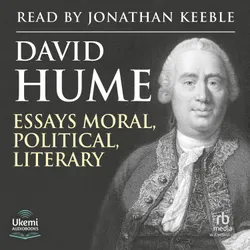
Essays, Moral, Political, and Literary
David Hume
audiobook
Harvard's Classics Collection: Complete 71 Volumes : The Five Foot Shelf & The Shelf of Fiction - The Classic Literature & The Greatest Works of Fiction from Antics to Modern Age
Johann Wolfgang von Goethe, Gotthold Ephraim Lessing, Bjørnstjerne Bjørnson, Thomas Carlyle, Theodor Storm, Plato, Theodor Fontane, René Descartes, Gottfried Keller, Mark Twain, Immanuel Kant, Charles Darwin, Martin Luther, Robert Louis Stevenson, William Shakespeare, Dante Alighieri, Euripides, Percy Bysshe Shelley, Charles Lamb, Henry David Thoreau, Henry James, Samuel Johnson, John Stuart Mill, Victor Hugo, David Hume, Joseph Addison, Jane Austen, John Locke, John Fletcher, Francis Beaumont, Leigh Hunt, Epictetus, Alphonse Daudet, Thomas De Quincey, Guy de Maupassant, George Eliot, Walter Scott, Laurence Sterne, Samuel Taylor Coleridge, Jonathan Swift, Christopher Marlowe, Wilhelm Grimm, William Hazlitt, Marcus Tullius Cicero, Daniel Defoe, Aesop, Richard Henry Dana, Henry Fielding, John Dryden, Philip Massinger, Pedro Calderón de la Barca, Bret Harte, George Sand, John Ruskin, Oliver Wendell Holmes, Ernest Renan, Robert Burns, David Garrick, Ralph Waldo Emerson, John Webster, Washington Irving, Izaak Walton, John Bunyan, Juan Valera, Alfred de Musset, James Russell Lowell, Charles Augustin Sainte-Beuve, Nathaniel Hawthorne, Homer, Edmund Burke, Plutarch, Molière, Aeschylus, Michael Faraday, Sophocles, William Makepeace Thackeray, Benjamin Franklin, Edward Everett Hale, Pierre Corneille, Jean Racine, Voltaire, Robert Browning, Oliver Goldsmith, Thomas Dekker, John Milton, Aristophanes, Blaise Pascal, Virgil, Richard Brinsley Sheridan, Simon Newcomb, William Penn, Walter Bigges, Philip Sidney, Herodotus, Walter Raleigh, Francis Bacon, Giuseppe Mazzini, Francis Pretty, George Berkeley, Thomas Hobbes, Adam Smith, Alessandro Manzoni, Abraham Cowley, Michel de Montaigne, Ben Jonson, John Woolman, Benvenuto Cellini, Sydney Smith, Jean Froissart, William Henry Harrison, William Harvey, Marcus Aurelius, Hans Christian Andersen, Thomas Malory, George Gordon Byron, Thomas à Kempis, Ivan Turgenev, Richard Steele, Thomas Browne, Archibald Geikie, Thomas Babington Macaulay, Leo Tolstoy, Fyodor Dostoevsky, Tacitus, William Roper, Hippocrates, Miguel de Cervantes, Thomas More, Friedrich von Schiller, Philip Nichols, Louis Pasteur, Joseph Lister, Jean Jacques Rousseau, Pliny the Younger, Charles W. Eliot, Edgar Alan Poe, Saint Augustine, Hermann Ludwig Ferdinand von Helmholtz, Francis Drake, Edward Haies, Niccolo Machiavelli, Ambroise Paré, William A. Neilson, Honoré Balzac, Alexander L. Kielland
book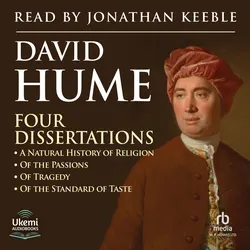
Four Dissertations : A Natural History of Religion, Of the Passions, Of Tragedy, Of the Standard of Taste
David Hume
audiobook
Hume’s Dialogues Concerning Natural Religion
David Hume
audiobookbook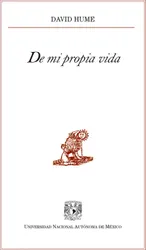
De mi propia vida
David Hume
book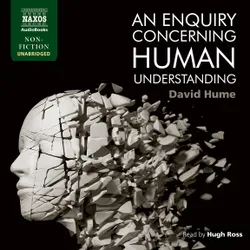
An Enquiry Concerning Human Understanding
David Hume
audiobookbook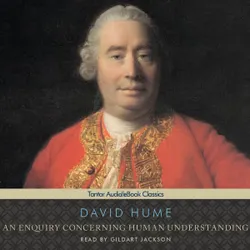
An Enquiry Concerning Human Understanding
David Hume
audiobookbook
The History of England Volume 5 : James I and Charles I
David Hume
audiobook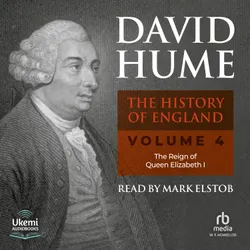
The History of England Volume 4 : The Reign of Queen Elizabeth I
David Hume
audiobook
